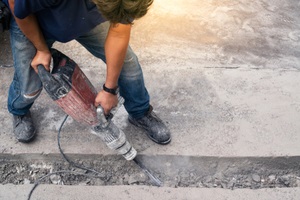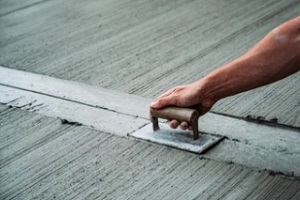 If your current driveway is in disrepair and needs to be replaced or you are considering installing a new one, you may be wondering what type of material you should use. For many homeowners, the choice comes down to concrete or asphalt.
If your current driveway is in disrepair and needs to be replaced or you are considering installing a new one, you may be wondering what type of material you should use. For many homeowners, the choice comes down to concrete or asphalt.
Both are popular and long-lasting driveway materials that are laid over a substrate of gravel, but they depend on different adhesives to hold their components together. Asphalt uses tar, while concrete uses cement, and the characteristics of these adhesives are what set the two options apart.
Here is a closer look at the main considerations when it comes to deciding between these two excellent driveway material choices.
Durability
When it comes to durability, a concrete driveway will typically last longer than an asphalt one. When a concrete driveway is installed properly in the right climate and is well-maintained, you can expect it to last for around 30 to 40 years. An asphalt driveway’s lifespan clocks in at just 20 to 30 years. While both are long-lasting, concrete has a slight edge. However, it is important to keep in mind that when either type of driveway is not installed on top of a stable and even substrate of gravel or it is not properly maintained, it may only last a few years.
Cost
Another important consideration for many homeowners is cost. In general, a concrete driveway is considerably more expensive than an asphalt one. The price site CostHelper reports that homeowners spend $2.24 per square foot on average for a new asphalt driveway; the average cost of a new concrete driveway is $4.36 per square foot. (1) However, these prices do vary depending on the driveway’s size, complexity and climate. When you factor in the longer lifespan of concrete driveways, they remain a cost-effective option.
Climate
The weather where you live will also influence the best choice of driveway material for your home. If it is very cold in the winter, keep in mind that concrete may crack, heave or buckle. Winterizing can help it stand up better to colder temperatures, but it is also worth noting that snow and ice take longer to melt on concrete than they do on asphalt. Additionally, the salt that is used to melt ice can cause staining, pitting and blotching on concrete that results in unattractive markings.
In hotter climates, asphalt may not be a good choice because the material can become sticky in high temperatures. Moreover, the cycle of softening under high heat and then hardening once again when the temperatures drop may lead to cracking or sagging in asphalt.
Maintenance
 Asphalt and concrete driveways are not high-maintenance options in general, but they both require some attention from time to time to get the most life out of them. When it comes to asphalt driveways, it is important to consider sealing.
Asphalt and concrete driveways are not high-maintenance options in general, but they both require some attention from time to time to get the most life out of them. When it comes to asphalt driveways, it is important to consider sealing.
After a new asphalt driveway is installed, it will take a few months to fully cure, at which point it will need to be sealed in order to prolong its lifespan and protect its surface. Every three to five years after that, it will need to be resealed.
Sealing is a very easy process that most homeowners can handle themselves. It entails pouring an asphalt sealer onto a clean and dry driveway and then spreading it evenly across the surface with a driveway squeegee. The need for sealing a concrete driveway is not as pressing, but it does help to reduce fading, which is particularly important on tinted driveways.
Another consideration when it comes to maintenance is the potential for staining. Asphalt’s dark, matte surface tends to hide wear and stains quite well, even with the darkest engine oil drips. In contrast, concrete has a tendency to show every spill and mark, which means that more intensive degreasing and cleaning are needed to keep it looking good and remove gas drips, rust, engine oil and other signs of use.
Appearance
Concrete is the winner when it comes to appearance as it can be tinted or stained into whatever color a homeowner desires. For example, it may be tinted to match or complement the color of the home. It can also be stamped with patterns or brushed to make the surface textured. Homeowners who want to recreate the look of brick and those who would like to add some interest in their driveway should go with concrete. Asphalt offers a more streamlined appearance that ties in well with the street and has an attractive dark surface that hides stains well.
Repairs
Driveways stand up to a lot of abuse, between adverse weather and being constantly driven on by heavy vehicles. Both types of driveways stand up well to light use, but you may want to consider the material’s ease of repair when something goes wrong.
 Asphalt’s softer consistency means that it deteriorates more quickly than concrete, but cracks and damage in asphalt tend to be easier to repair and blend into the remainder of the driveway. In addition, applying a new top coat of asphalt is a relatively simple process.
Asphalt’s softer consistency means that it deteriorates more quickly than concrete, but cracks and damage in asphalt tend to be easier to repair and blend into the remainder of the driveway. In addition, applying a new top coat of asphalt is a relatively simple process.
Concrete, on the other hand, is more difficult to repair, and any spots that are patched tend to be quite obvious. The whole driveway can be resurfaced if this is a concern, but it is important to keep in mind that it will be expensive to do so.
No matter which type of driveway you choose, getting a new driveway installed is a big expense, so it is important to choose something that you are certain you will be happy with in the long run and ensure that you get the most for your money.
Get in Touch With Dirt Connections
Reach out to Dirt Connections for all of your Northern Virginia residential driveway needs. We offer high-quality asphalt and concrete driveways and private roads and carry out every project to the highest of standards. Our experienced team can help you determine the right driveway solution to fit the needs of your home and budget.
Summary

Dirt Connections was started with one goal in mind: providing quality residential and commercial construction services to clients on time and on budget. Reach out for more information on how we can support your next project.
For your convenience our estimates are free and by appointment. Call 703-940-9949 for a free estimate today!









































